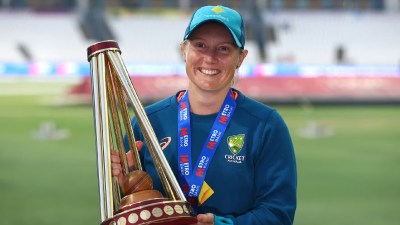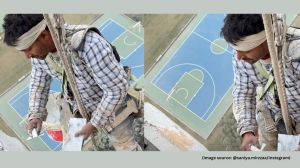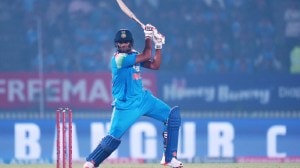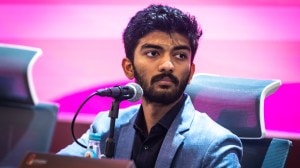Rhythm blues
Unlike other high-profile disciplines,gymnastics isn't a realistic medal hope for the country. But as <i>Shivani Naik</i> finds out,the squad is preparing to flash their rehearsed smiles through various obstacles,even though it isnt the finishing touch to a perfect routine
The story goes that since composure and poise are so integral to the overall impression created in rhythmic gymnastics,Indias 33-year-old coach Varsha Upadhye took special efforts to ensure that be it in folly or in fame,her gymnasts would score the perfect-10 smiles,summoning rehearsed grins to their faces with just the right number of teeth bared. Often in practice,with one of them bending their bodies with yogic felicity and striking an elasticity-defying pose,another team-mate would suddenly lean down in front of her and shove at her a small mirror,forcing the gymnast in that awkward tangling of limbs to adjust the smiling face. The three girls,Shipra Joshi,Akshada Shetty and Pooja Surve,also mastered the precise curve of facial lines that could express attitude when the confident visage was demanded. It was the winsome grin though,that was strictly enforced everyday.
But having to tame inanimate props a long ribbon,a wide hoop,a slippery ball and a rope with two loose ends the practiced,confident,smile didnt always reach the eyes.
The seven metre long ribbon,though attractively weaving spirals and waves in the air,always threatened to knot itself when Pooja Surve took to the mat-stage. There was always the fear often reflected in their eyes under the artistically painted bright fuchsia,purple and orange eye-shadows that the hoop once flung in the air would go wheeling wildly elsewhere while Shetty wrapped up her jumps and pivots. And though it was her favourite apparatus she was the flexi-est of the lot Joshi never stopped worrying if the ball would slip down from her body and simply roll away. The Smile at all times,and in all pauses was more a contingency back-up to minimise the embarrassment of a possible mistake,than the finishing touch to a perfect 90-second performance set. Grin-and-bear was a different proposition when Indian gymnasts attempted the lingering 180 degree leg-split,something that theyve been practicing for only the last few years the wrong side of their teenage life,and simultaneously trying to beam away.
Coach Upadhye herself Indias first woman judge when she was part of the jury at the last Commonwealth Games in Melbourne though was in stock-taking mode in 2007 after she returned from Australia. Determined to prepare a decent team for Delhi,she knew that shed have to make the most of the three years left with the available bunch of girls. These girls werent doing rhythmic gymnastics and started only a few years back,which meant flexibility was tough to build at that age. You can only maintain that after the age of sixteen,so I started focussing on presentation,she says,adding,I know we might not win a medal at Delhi,but I want them to stand next to the Canadians and the English gymnasts and give a decent account of themselves.
For the first time in Indian gymnastics,costumes made of 4-way-stretch material were imported by the government,as parents enthusiastically worked and reworked on the designs with sequins,colours and fake Swarovskis with the tricolour stiched in. International exposure stints followed soon after,in the run-up ensuring that the big occasion didnt get to them. Surve recalls how at her first international in Belarus,the sheer blinding lights froze her mid-movement as she realised she couldnt spot or catch the hoop flung in the air against the mammoth crowds and the shining glare. There was barely a tube-light when theyd practiced their routine back home at Mumbai Universitys Kalina indoor stadium. Not that Upadhye complained. What I need is a good practice mat,and good height because gymnasts throw props up in the air. When we came to the university centre,it was still under construction. But what I really needed was just the mat. The un-built stands and steps didnt matter, she says.
Unlike any other sport at the CWG,rhythmic gymnastics draws its entire squad of three from one centre,Mumbai. Upadhye herself was part of the Indian squad in the early 2000s,before she took up employment as duty manager with an airways. She gave up her day-job to focus completely on coaching in 2007,and shifted her modest summer camps on Shivaji Parks makeshift mats to a nearby sprawling terrace,with a mat loaned by the kabaddi association office. I need just a mat and the height, she reiterates,adding that 2014 will be a different story since she now has at least 100 girls in the age-group of 5-15,who can sit uncomplainingly on vertical leg-splits one leg straightened on a chair,the other in line behind the body and will be ready to medal-perfection by the next Games.
Rhythmic gymnastics needs concentration,and the Kalinas indoor facility provides the required privacy. Its a women oriented sport with attractive costumes,which means that we cant have passersby gawking at us in practice,because if the girls get conscious,mistakes will happen, she says. Maharashtra made up five of the six in the team that participated in the Delhi Asiad in 1982,but Mumbai is yet to get a single indoor hall devoted solely to the sport. As a non-NIS coach,Upadhye had to fight off her own battles,but the biggest challenge for her was keeping a hawk-eye on what the girls eat. Sometimes I feel so bad to stop them from eating,but they have to stay in shape. Gymnastics is a lot about presentation,and they know if they munch on junk,theyll have to work harder the next day, she says. The coach makes a daily call to Shettys home at 9 pm to check if her ward is in bed. If she doesnt get enough rest,her back will not take the load next day. I have to ensure that each tissue is relaxed, she says of her femme-military regimen.
For the girls,all in college now,it has been a sacrifice of two years away at camps in Balewadi,Pune. The dedication has been such that India captain Joshi carried her Class 10 books to camps in her board-exam year. Its tough to explain to friends why we need to spend 7-8 hours daily for something that is only 90 seconds long, Shetty says,adding that though they groan and grit their way through the stretching the most painful and most crucial aspect of a gymnasts training,since they are judged on flexibility itll all be worth it in Delhi on D-day.
Surve recalls her first big National Games at Guwahati,when as the opening performer,she had erred in a pivot and collapsed with a ligament tear. The next 5-6 months were terrible as I couldnt practice,and rehab was painful after a surgery. But I knew I wanted to be in the team,and so I worked hard, the 18-year-old with a base in the Kathak classical dance form and aspirations to IAS,says. Joshi,the youngest,who favours the difficulties of the ball-apparatus,says she will aim at upwards of 20 marks,and hope and pray the rope and ribbon dont vacantly sway away. If nothing else,the trio promise to not let the Smile fade away.
- 01
- 02
- 03
- 04
- 05































